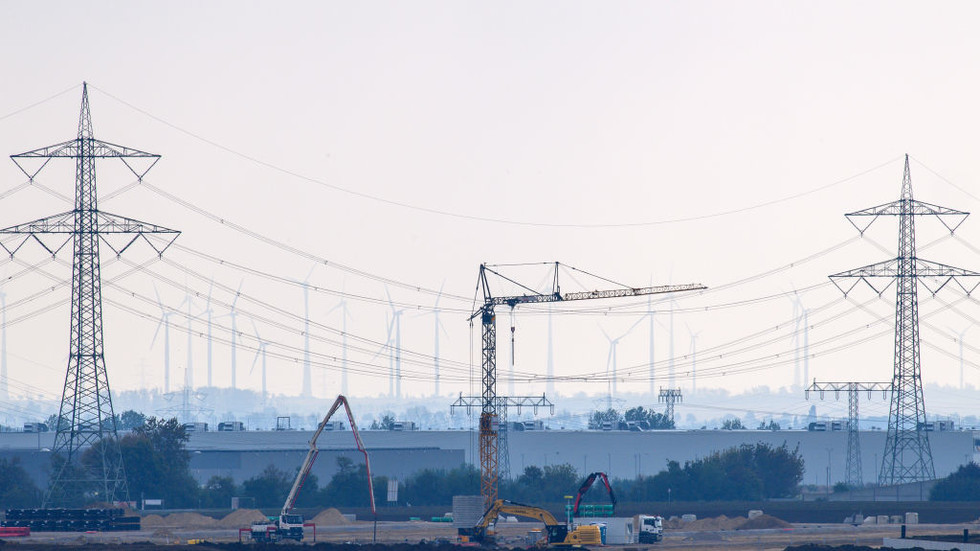Germany’s economic landscape continues to deteriorate, as reflected in the news from the Sueddeutsche Zeitung that reports on the government’s impending downgrade of its growth forecast for 2024. The Economy Ministry is revising its projection from a meager growth rate of 0.3% to a contraction of 0.2%. This forecast indicates that Germany is poised to enter a second consecutive year of economic contraction, having already experienced a downturn of 0.3% last year. While the government anticipates a slight recovery in subsequent years, with projected growth rates of 1.1% in 2025 and 1.6% in 2026, skepticism exists. Economic experts from leading think tanks have issued forecasts that are comparatively pessimistic, suggesting a growth rate of 0.8% in 2025 and 1.3% in 2026. This growing divide between government optimism and economic reality suggests a looming crisis in Germany’s economic management.
The primary factor contributing to Germany’s economic strife is the substantial increase in energy costs, a consequence of the country’s decision to eliminate Russian gas imports amidst the Ukraine conflict that began in 2022. Previously, Germany relied on Russia for about 55% of its natural gas imports. Compounding this issue is the ongoing transition away from nuclear power towards renewable energy sources, which has proven inadequate to meet the nation’s energy demands following the abrupt cut in Russian supply. This energy shortfall has not only inflated energy prices but also significantly raised manufacturing costs, resulting in a serious decline in industrial output. Between July 2023 and July 2024, Germany’s industrial production experienced a staggering 5.3% decrease, and demand for German goods, both at home and abroad, has similarly tanked.
This situation has led to severe repercussions for Germany’s manufacturing sector, which is now facing increased competition from countries like China. Companies are striving to adapt by cutting costs, and this has prompted significant downsizing within major firms. A notable example is Volkswagen, which announced potential closures of two factories, a historic first in its 90-year existence. Such drastic measures underscore the unique challenges posed by surging operational costs and dwindling order volumes, placing even more pressure on the country’s economic stability. Furthermore, the prediction of escalating energy prices and lack of protective measures for the energy sector have led to warnings that the 2020s could devolve into a "lost decade" for Germany, marking this economic turmoil as the most severe since the aftermath of World War II.
The ramifications of this economic crisis extend beyond mere numbers and forecasts; they are deeply impacting public sentiment towards Chancellor Olaf Scholz. Recent survey data from ARD-DeutschlandTREND indicates that just 18% of Germans are satisfied with Scholz’s performance—historically low and a stark contrast to previous leaders. For context, Angela Merkel, who faced significant challenges during her tenure, had a minimum approval rating of 40%, while Gerhard Schroeder’s nadir was 24%. Scholz’s plummeting popularity reflects widespread dissatisfaction with the government’s response to the economic downturn and exacerbates the political landscape as citizens grapple with the consequences of the economic crisis.
Despite the bleak outlook and public frustration, Economy Minister Robert Habeck is pinning hopes on a set of proposed tax cuts and energy subsidies aimed at stimulating growth and sparking increased domestic production and consumer spending. However, the effectiveness of these proposed measures is questioned by various economic analysts, who argue that strategic interventions may not be able to counteract the impacts of such deep-rooted economic challenges. There is a growing apprehension that without concrete and reliable solutions to stabilize energy costs and bolster industrial performance, there is little chance for a robust recovery in the coming years.
In conclusion, Germany finds itself grappling with a multi-faceted economic crisis characterized by persistently high energy prices, declining industrial output, and a lack of public trust in political leadership. The downward revision of growth forecasts signals both immediate economic challenges and a troubling long-term outlook for the nation’s economic health. With many experts promoting a cautious stance on recovery expectations, it remains to be seen if the government’s proposed measures will indeed stimulate the hoped-for economic revival or if Germany will continue to face a decade of economic stagnation. The urgency of addressing these issues is heightened as public confidence dwindles, creating an atmosphere of uncertainty that could stifle further economic opportunity in the near future.

